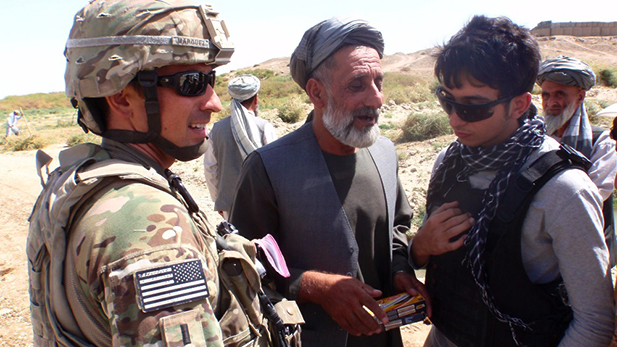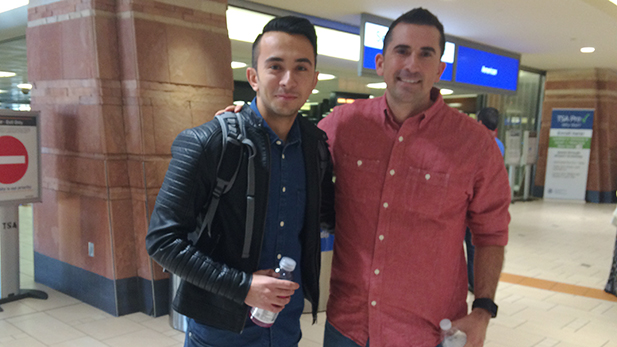 Aaron Marquez (left) and Alex (right) in Afghanistan in 2012.
Aaron Marquez (left) and Alex (right) in Afghanistan in 2012.By Jude Joffe-Block, Fronteras Desk
Listen:
In 2012, Aaron Marquez was stationed in Afghanistan as a civil affairs officer for the Army. He relied on a young Afghan man to interpret for him. It was a dangerous job.
“They knew that as soon as we left, their protection would be limited and their families would be at risk,” Marquez said.
That's why Marquez asked that his interpreter be referred to only as Alex, the Americanized version of his first name. It’s to protect Alex’s family, who is still in Afghanistan.
Marquez returned to Phoenix in the fall of 2012 and works in real estate. He's currently a captain in the Army Reserve.
Once back, Marquez and other soldiers from his unit began helping Alex secure a Special Immigrant Visa, a visa for those who worked with U.S. military.
The program was slow to get off the ground, but as of 2014, almost 30,000 Iraqis and Afghans who worked with the U.S. military, and their relatives, resettled in the U.S, according to the Congressional Research Service.
An additional 38,000 Iraqis and relatives who worked for U.S. organizations — including the military, NGOs and American journalists — were also resettled in the same period. Long delays are typical.
In the case of Afghan interpreters, it is a separate way into the country from the refugee program that is now under debate in the U.S. in the wake of the Paris attacks.
Iraqi interpreters, on the other hand, could face new barriers under a bill passed last week by the House of Representatives. It would change the way refugees from Syria and Iraq are admitted.
 Aaron Marquez (right) and his former interpreter Alex (left), reunited at Phoenix Sky Harbor Airport in 2015. In the wake of the U.S. withdrawal from Afghanistan, the Biden administration says it plans to resettle tens of thousands of Afghans in the U.S., including many who helped American troops.
Aaron Marquez (right) and his former interpreter Alex (left), reunited at Phoenix Sky Harbor Airport in 2015. In the wake of the U.S. withdrawal from Afghanistan, the Biden administration says it plans to resettle tens of thousands of Afghans in the U.S., including many who helped American troops. After years of waiting, Alex flew from Europe to Phoenix last month. Marquez waited at the airport for Alex to arrive.
“You know it has been three years since I have seen Alex and I am excited to help him get his start here in Phoenix,” Marquez said. “But also nervous. I’ve never had somebody from another country come and me be one of their only contacts to help start a new life.”
Soon, Marquez spotted Alex, who is now 22. He is thin with dark hair and a big smile.
“Welcome to Arizona,” Marquez said.
“Thank you so much, it has been a long time,” Alex replied.
As Marquez drove Alex from the airport, Alex took in his first views of his new city.
“It looks beautiful actually,” Alex said. “Everything is new. It is a new life. I’m going to have to start it all over.”
Which won’t be easy, but the soldiers Alex served with are trying to help.
They started an online fundraiser for him and have raised more than $6,400 so far. A fellow Phoenix veteran is taking in Alex as a roommate.
Alex said he spent the last year and a half in Sweden because he had to get out of Afghanistan, but his U.S. visa wasn’t ready.
“I have been known by people that I was helping the coalition soldiers, so I had been getting threats from individuals that I need to quit my job or otherwise I am gonna get killed,” Alex said.
Marquez and his fellow soldiers are part of a wider network of veterans trying to help interpreters come to the U.S. Marquez recently heard from another Phoenix-area veteran who asked his advice for helping an Afghan interpreter whose visa was stalled.
Another veteran, Matt Zeller, founded the Washington, D.C.-based organization No One Left Behind to help interpreters obtain visas and get settled in the U.S. Zeller said more visas should be allocated, along with more services for interpreters once they arrive.
“I understand that all immigrant populations have struggled, but this is a special one,” Zeller said. “They are veterans of our wars. They fought and bled and died with our people in our uniform.”
Zeller credited his interpreter – who is now in the U.S. – with saving his life in Afghanistan.
Zeller’s group is trying to help 120 interpreters and their families annually with three months of rent, furniture and a donated car.
He was inspired after he found out about an Afghan interpreter who got a visa but wound up homeless here. So the man returned with his family to Afghanistan. Zeller said he was told they were all killed by the Taliban.
“We clearly can do better than this. We ought to do better than this,” Zeller said. “Quite frankly they have done more than our citizens have to defend liberty and we owe them this modicum of a welcome.”
Back with Aaron Marquez and Alex, their first stop after the airport was Khyber Halal, an Afghan restaurant in central Phoenix.
Alex was excited to see samosas, a kind of turnover, on the table. He had not had been able to get the food he grew up with in the small Swedish town he was living in before.
“My mom used to make this when I was in Afghanistan, so I missed it,” Alex said before trying one.
The restaurant owner, Fahima Hassan, came over to greet Alex in Dari, one of Afghanistan's official languages.
Hassan said she was also was an interpreter during the war, and said other former interpreters often come through the restaurant.
Alex will be back, now that he is a Phoenix local.
Next he plans to get a job and enroll in college. He’s thinking about studying computer science.
Fronteras Desk is a collaborative of public media entities in Arizona, California, Nevada, New Mexico and Texas, including Arizona Public Media.

By submitting your comments, you hereby give AZPM the right to post your comments and potentially use them in any other form of media operated by this institution.